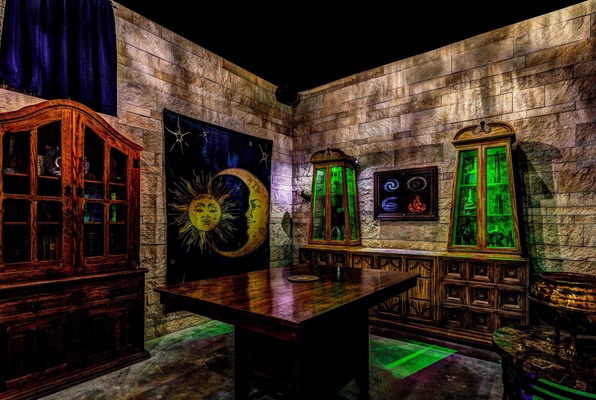Escape Room Orlando: An Immersive Journey for Group Structure and Enjoyable
Escape Room Orlando: An Immersive Journey for Group Structure and Enjoyable
Blog Article
Explore Why Escape Rooms Are Fun and Deal a Distinct Way to Bond With Pals and Household
Retreat rooms have actually emerged as a fascinating kind of home entertainment, supplying a blend of immersive narration and mental stimulation that is both difficult and satisfying. What exactly sets getaway areas apart as a bonding experience?

Immersive Narration
While the concept of retreat rooms might at first appear simple, it is the immersive storytelling that genuinely sets them apart. These experiences are diligently designed to move participants into an additional world, weaving compelling stories that involve and astound. From the moment players enter the room, they are covered in a meticulously crafted atmosphere, total with detailed details, sound impacts, and thematic components that serve to improve the story.
Each retreat room features a distinct story, usually involving an objective or secret that individuals have to solve within a set timeframe. The story is not just a background yet is essential to the experience, affecting the design of puzzles and the layout of the area. This narrative-driven approach guarantees that every component, from the hints to the design, adds to the unraveling story, creating a cohesive and immersive setting.
Additionally, making use of innovative technology and interactive attributes further deepens the immersive experience. Electronic user interfaces, increased reality, and sensory effects can make the tale come active, enabling participants to feel as though they are absolutely component of the unfolding drama. This immersion cultivates a feeling of excitement and urgency, boosting the general pleasure of escape areas.
Psychological Stimulation
Participating in getaway rooms offers individuals a special form of psychological stimulation that tests cognitive capabilities in diverse and revitalizing methods. These immersive experiences require people to resolve intricate challenges, analyze codes, and think seriously under time constraints. This setting promotes boosted analytical skills, as individuals must browse a series of complicated challenges that need logical thinking and creativity.
Retreat spaces often include a range of problem types, from mathematical formulas to etymological riddles and spatial recognition tasks. This selection guarantees that various cognitive functions are involved, providing a detailed mental workout. For instance, fixing a cipher might hone logical abilities, while a physical puzzle could improve hand-eye sychronisation and spatial thinking. The necessity to shift between various kinds of thinking keeps the mind active and involved.
Additionally, the time-sensitive nature of retreat areas adds an element of pressure that improves cognitive performance. Participants are motivated to believe promptly and successfully, improving their ability to process info and choose quickly. This elevated state of psychological task can lead to increased focus and sharper cognitive abilities, making escape rooms not just an amusing diversion but additionally an important exercise for the brain.
Team Effort and Teamwork
Remarkable Experiences
Typically, among the most engaging facets of getaway areas is the creation of unforgettable look at here experiences that linger long after the game has actually concluded. The immersive nature of getaway areas, with their elaborate challenges and involving storylines, supplies individuals with a sense of achievement and sociability that is hard to duplicate in various other social tasks. These experiences become treasured memories, usually recounted with interest and fond memories.
The collaborative effort needed to fix the challenges fosters a special feeling of unity amongst individuals. Friends and relative are provided the possibility to collaborate in a high-pressure, yet fun environment, boosting and reinforcing bonds interaction abilities (orlando escape room). The shared success and also the periodic failings add to a cumulative feeling of success and pleasure
In addition, the thematic diversity of retreat areas makes certain that each experience stands out. Whether browsing a haunted manor or deciphering clues in a spy-themed setting, the selection maintains the exhilaration fresh and the memories dazzling. This selection not just accommodates different rate of interests but also ensures that each visit to an escape area is an one-of-a-kind journey.
Essentially, getaway rooms offer unforgettable experiences that construct enduring connections and offer stories to be valued for several years to find.
Conclusion
Getaway areas provide an unique method for bonding through their immersive narration, psychological stimulation, and reliance on synergy and cooperation. Getaway spaces arise as a unique and satisfying activity, integrating amusement with the development of vital social and cognitive abilities.

Structure on the foundation of synergy and collaboration, the adventure of the challenge in retreat rooms uses participants a thrilling experience that tests their analytical capacities and mental acuity - escape room orlando.Additionally, the meticulously crafted complexity of getaway areas ensures that no two experiences are alike.Usually, one of the most compelling elements of retreat areas is the creation of unforgettable experiences that stick around long after the video game has wrapped up.Additionally, the thematic variety of escape spaces makes sure that each experience is distinctive
Report this page